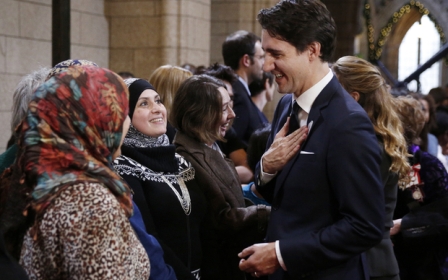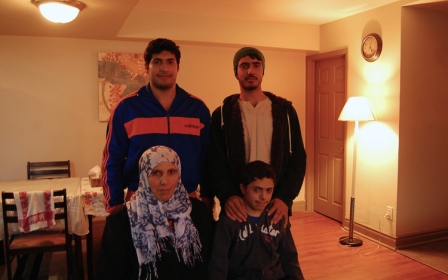Canada calls on UN to review Palestine human rights appointment

TORONTO, Canada – Canada’s foreign minister has called on the United Nations to review the appointment of a Canadian legal expert as the new Special Rapporteur on human rights in the occupied Palestinian territories.
On Friday, Stephane Dion urged the UN Human Rights Council to review the appointment of Michael Lynk, a law professor at the University of Western Ontario, and ensure the Special Rapporter “has [a] track record that can advance peace in region”.
“Canada will continue to advocate for transparent processes for the appointment of credible, impartial & objective Special Rapporteurs,” Dion wrote on Twitter.
The public comments came as pro-Israel lobby groups and conservative lawmakers have come out in full force against Lynk, accusing the professor of a pro-Palestinian bias and of being involved in “anti-Israel advocacy” in Canada.
But supporters and experts on the Israel-Palestine conflict in Canada say Ottawa has dangerously tarnished the reputation of a respected legal scholar without cause – and the attacks against Lynk may have a silencing effect on other Canadians.
“He is a person of recognised integrity and also a very good and conscientious law scholar. His scholarship includes international law on the Israel/Palestine conflict of a high standard,” Craig Scott, a former Member of Parliament and law professor at the University of Toronto, wrote in a letter to Dion.
“We as Members of Parliament (me formerly and you currently) may be used to being targets of politicised personal attacks,” Scott, who said he has known Lynk since the 1980s, wrote.
“But it is not the role of politicians to dole out the same treatment to Canadian citizens who are in good faith trying to do their part to achieve respect for human rights and the rule of law in their area of interest and competence,” Scott wrote.
‘Disappointing and disturbing’ attack
Shimon Koffler Fogel, CEO of the Centre for Israel and Jewish Affairs, a pro-Israel lobby group in Canada, “strongly denounced” Lynk’s appointment and called on Ottawa to object, as well.
In a statement, Fogel described the Special Rapporteur position as “an office that reflects the UNHRC’s systemic prejudice against Israel” and said it should be shut down completely.
“Mr. Lynk has a long record of involvement with anti-Israel initiatives and has repeatedly made public statements that demonstrate hostility towards Israel,” he wrote.
In an email to Middle East Eye, Lynk said he was not in a position to comment because he has not yet received directives from the UN in Geneva about his new role.
He said, however, that he was happy to take over the Special Rapporteur position, and will carry out his duties impartially and in accordance with international law.
The director of communications for Canada's ministry of foreign affairs told MEE that UN resolutions lay out clear criteria for special procedures mandate holders to ensure that they “uphold the highest standards of efficiency, competence and integrity, meaning, in particular, though not exclusively, probity, impartiality, equity, honesty and good faith.
“The key issue here is impartiality,” said Joseph Pickerill. “We are concerned by some reports and past statements made by candidates for the role.”
The position of “Special Rapporteur on the situation of human rights in the Palestinian territories occupied since 1967” has been vacant since January when the former envoy, Makarim Wibisono, resigned after Israel denied him access to the territories he was meant to investigate.
“Unfortunately, my efforts to help improve the lives of Palestinian victims of violations under the Israeli occupation have been frustrated every step of the way,” the Indonesian diplomat said in a statement at the time.
Wibisono’s term as Special Rapporteur will officially conclude on 31 March.
Tyler Levitan, campaigns coordinator for Independent Jewish Voices-Canada, told Middle East Eye it was disappointing to see the government using talking points that are most often used by Israel lobby groups to question Lynk’s appointment.
“It’s again disturbing, disappointing and really ridiculous that our government would be focusing so much attention on people who are seeking truth and justice and peace, rather than going after the perpetrators of these crimes,” Levitan told Middle East Eye.
Levitan said the attacks could have a silencing effect on other Canadians who may want to speak out against Israeli human rights violations, but will now fear a backlash.
The controversy also comes after a Canadian parliamentary motion condemning the Palestinian-led boycott, divestment and sanctions (BDS) movement, whose goal is to hold Israel accountable for human rights violations, was criticised for doing the same thing.
“These kind of character assassinations we’ve seen happen time and time again and I think are used as setting an example – if other people will consider speaking out against Israel’s violations of international law, then they can expect the same type of treatment,” he said.
“It’s just a terrible sign of things to come.”
A legal expert with Middle East experience
Before taking up his current position as an associate professor in the law faculty at The University of Western Ontario, Lynk practised labour law in Ottawa and Toronto for over a decade.
He was a refugee affairs officer at the United Nations Relief and Works Agency (UNRWA) in Jerusalem in 1989 and worked in refugee camps in the West Bank during that time, according to a report commissioned by the UN to vet candidates for the vacant position.
Lynk, the report outlined, had “a concrete vision for implementing the mandate whilst aware of the challenges” and “outlined his commitment to exploring new ways to work, including through use of modern technology”.
Lynk co-edited the book “International Law and the Israeli-Palestinian Conflict: A Rights-Based Approach to Middle East Peace”. He has written extensively about international law as it relates to the conflict, including the legal status of Israel’s separation wall and how joining the International Criminal Court could see both Israelis and Palestinians face war crimes charges.
In 2013, he called on the Palestinian leadership to take Israel to the ICC over its settlements in the West Bank. Israeli settlements in the occupied Palestinian territories, Lynk noted, are designated as war crimes under the 1998 Rome Statute of the ICC.
“More than anything else the Palestinian leadership could do, seeking membership in the International Criminal Court and preparing to bring a complaint against Israel for its settlements has the potential for dramatically altering the political landscape in the Israeli-Palestinian conflict,” Lynk wrote in a post published by Mondoweiss, a blog on Israel, Palestine and US policy.
Lynk also serves on the advisory board of the Canadian Palestinian Education Exchange (CEPAL), a Canadian group that provides educational opportunities, support and training to Palestinian refugees living in Lebanon.
A ‘new McCarthyism’?
In a statement condemning Lynk’s appointment, Conservative parliament member and opposition foreign affairs critic Tony Clement took a political shot at Prime Minister Justin Trudeau’s Liberal party for allegedly not showing enough support for Israel.
“Under the Conservative government there was never a doubt that Canada stands steadfastly with Israel; that indeed Canada stands by Israel through fire and water,” Clement wrote in a statement.
“By standing silently by in the wake of this appointment instead, we must ask if that is still the case?”
According to Thomas Woodley, president of Canadians for Justice and Peace in the Middle East, the Conservatives used Lynk’s appointment to try to demonstrate that their support for Israel is stronger than the Liberals’.
“Knowing that Dion has no say whatsoever in this appointment, Tony Clement was out to score a few political points at the expense of our freedom of speech and freedom to speak out against human rights abuses. I’m surprise and disappointment that Dion took the bait,” Woodley told Middle East Eye.
For many, the situation is a worrying reflection of the limits on freedom of speech when discussing Israel and Palestine.
“Those of us who support human rights need to be just as loud as the pro-Israel lobby -- in fact, much louder. The invective now being directed against Michael Lynk is only a symptom of a deeper political malaise,” wrote John Baglow, a blogger at progressive Canadian politics website rabble.ca.
“A person of his accomplishments needs no defence, but there is much more at stake here. The old McCarthyism flourished because people were afraid they would be targeted if they spoke out. Can we find the courage to put an end to the new one?”
New MEE newsletter: Jerusalem Dispatch
Sign up to get the latest insights and analysis on Israel-Palestine, alongside Turkey Unpacked and other MEE newsletters
Middle East Eye delivers independent and unrivalled coverage and analysis of the Middle East, North Africa and beyond. To learn more about republishing this content and the associated fees, please fill out this form. More about MEE can be found here.



